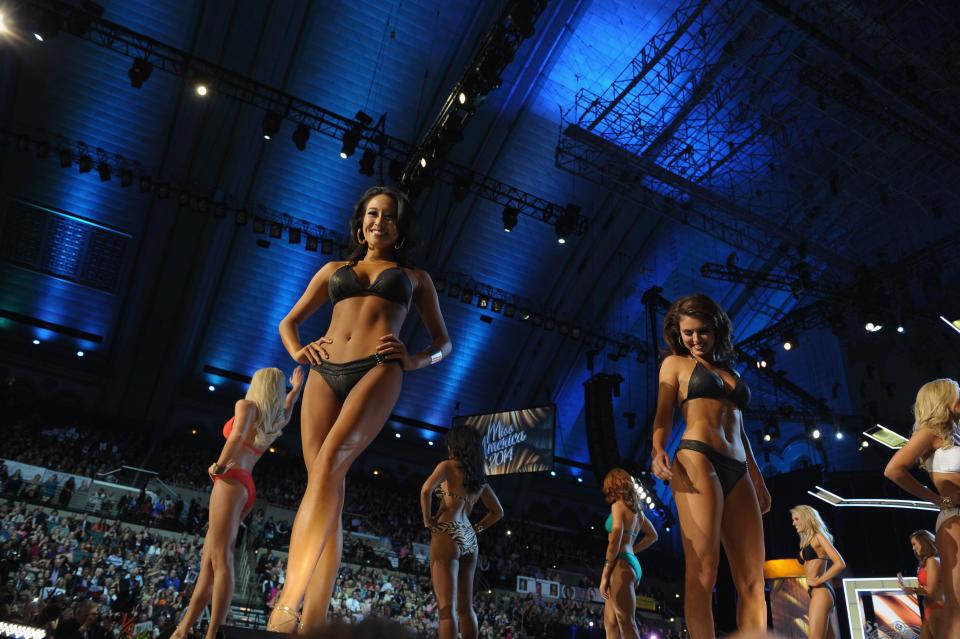Miss USA, Miss Teen USA resignations: A reminder of beauty pageants' controversial history
This week, the reigning Miss USA and Miss Teen USA said they are handing back their crowns, another reminder for pageant spectators that the tradition, with all its extravagance and glamour, has been beset by a long series of controversies.
Noelia Voigt announced on Monday that she was stepping down after winning the Miss USA title in September 2023 and participating in Miss Universe later that year. Without describing the details of what led her to resign, Voigt told her Instagram followers: “Never compromise your physical and mental well-being. Our health is our wealth.”
Two days later, UmaSofia Srivastava said she was resigning from the Miss Teen USA title as well, citing disagreement with the organization.
It’s the latest trouble in an industry that in recent years has faced harsh criticism about its effects on women and girls, a decline in viewership and participation and a troubling reputation for sexism. Meanwhile, experts say some of the biggest U.S. pageants have made strides at reform, and many participants find great benefits in their confidence and opportunities.
“It is a very mentally, physically, emotionally taxing thing” to be catapulted into the spotlight as a winner of a major pageant, said Hilary Levey Friedman, the author of “Here She Is: The Complicated Reign of the Beauty Pageant in America” and the daughter of Miss America 1970.

The rise – and fall – of pageants in the US
Beauty pageants have an inextricable link to the path of feminism in the U.S., Levey Friedman said. Miss America was started the year after women got the right to vote, and the iconic sashes worn by participants in pageants large and small come from the sashes worn by suffragettes, according to Levey Friedman, who teaches a course on beauty pageants in American society at Brown University.
In the past, pageants were a way for a woman to boost her academic and occupational opportunities in ways she couldn’t otherwise, though they were first started by men to make money off women’s bodies, she said. Fame and scholarships awaited winners in some contests; a small-town girl could make it big on the stage with a boost from a pageant win. Today, barriers to jobs and college educations have eased, and women don’t need pageants to make those moves, Levey Friedman said. But over the years, participation in pageants has fallen off.
More: How a 1968 Miss America protest propelled the women's movement into national spotlight
Viewership has also plummeted, and once widely televised competitions have gone off the air. Pageants have faced waves of criticism for seeming to hyperfocus on women’s appearances and bodies, causing some rebranding over the years, including the introduction of all-women judges for competitions like Miss Universe.
Industry has shifted gears, somewhat
In 2018, then-Miss America board chairwoman and former title holder Gretchen Carlson announced the organization was axing its bathing suit judging round: “We are no longer a pageant. We are a competition,” she told Good Morning America. The focus shifted to onstage interviews of the participants.
Miss USA is a separate competition and still features a bathing suit round. At the local level, pageants for young girls and women across the country fall into different categories, some called “glitz pageants” that focus more on physical beauty, and others that have an emphasis on interviews and academic scholarship prizes.
Today, “there’s much more of a focus on, ‘this is for women, and not for the male gaze.’” Levey Friedman said. “On the ground, it seems less sexist, but I don't think the public narrative has changed.”

Experts say beauty pageants can also have a negative impact on the mental health and body image of not just participants, but also spectators.
Brandyn Churchill, a professor of resource economics at the University of Massachusetts Amherst, found in a study published last year that there was a link between increased media coverage of pageant winners in their home states and increased body image issues in young girls in those states between the 1990s and early 2000s.
“It’s extending a pretty strong signal about what is the ideal body type that … does contrast with what individuals are viewing when they look in the mirror,” Churchill said.
The study found that in the home states of Miss America or Miss USA winners, there was increased media coverage of the pageants, and at the same time, young women and girls were more likely to report they were trying to lose weight or have a skewed image of their weight. Teen girls were also 5% more likely to report taking steps to try and lose or maintain their weight. The results were more pronounced in the South and Midwest, Churchill said.
Toddler girls to adult women across the U.S. participate in pageants. From a young age, participants don elaborate outfits and makeup. As they get older, hair extensions, fake nails and even dental veneers come into play, Levey Friedman said. Some girls are told they are beautiful while looking far from their natural selves.
“That sort of dissonance, I think is potentially very damaging as well,” Levey Friedman said.
Miss USA 2019 Cheslie Kryst died by suicide in 2022 and her family said she struggled with depression behind the scenes of her pageant wins.
Why pageant culture stays strong in many communities
Still, pageant participants often cite the benefits they get from participating, including increased public speaking skills, confidence and opportunities to receive academic scholarships or professional connections, Levey Friedman said.
The Miss America and Miss USA organizations didn’t immediately respond to requests for comment, but their websites both say they provide opportunities for women to empower themselves and become leaders.
“(W)e celebrate beauty, intelligence, and empowerment,” the Miss USA website says.
Leilanni Redd is a 28-year-old Californian who participated in pageants from the time she was 6 years old. She now works full time as a coach, training school-age girls on aspects of competitions including their wardrobes and pageant routines. Her students are from all over the country, and she said pageant culture is particularly strong in southern states like Alabama and Texas.
“Growing up, I was a very shy kid,” she said. “It did give me confidence that I didn't know I could have when performing.”
Redd said she never felt some of the negative pressures on her self-esteem that the industry is known for, but she knows her experience isn’t universal. Though she said her body never looked like the other girls competing, “I never once felt uncomfortable. I never once wanted to change my appearance because I saw other people look a certain way.”
Her students may go on to compete on a national stage, but their paths are wide open and many will pursue other opportunities and treat pageantry similarly to other kids who play a sport. Still, Redd said it’s hard to see so much turmoil in the industry.
“It's a little tough right now to see that these girls are stepping down because a lot of girls work for the title of Miss USA and Miss Teen USA,” Redd said. “To see it crumbling at the moment is a little heartbreaking because it's like, what's the future going to look like for these girls?”
This article originally appeared on USA TODAY: Miss USA, Miss Teen USA resign: Pageants have a controversial history


